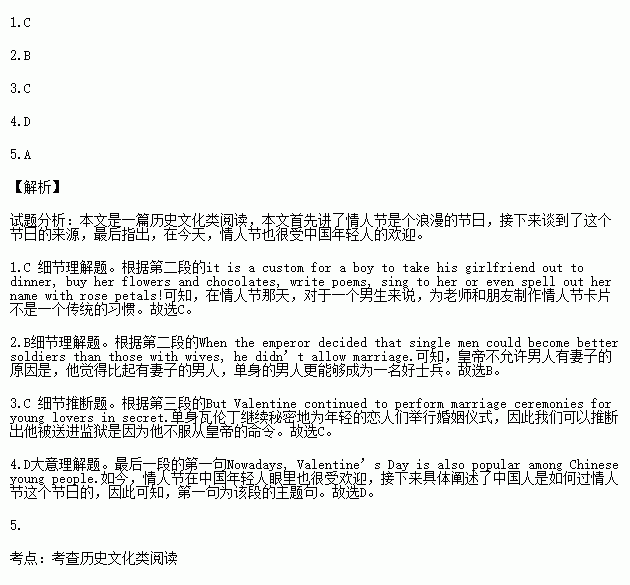题目内容
February has long been a month of romance. With the sweet smell of roses in the air, romantic films hit cinemas and love stories fill newspapers and magazines.
On the 14th day, it is a custom for a boy to take his girlfriend out to dinner, buy her flowers and chocolates, write poems, sing to her or even spell out her name with rose petals! This is what you see on Valentine’s Day, a day named after Valentine who was a priest in the third century Rome. When the emperor decided that single men could become better soldiers than those with wives, he didn’t allow marriage.
But Valentine continued to perform marriage ceremonies for young lovers in secret. When his actions were discovered, the emperor sentenced him to death. While in prison, it is said that Valentine fell in love with the daughter of his prison guard. Before his death, he wrote her a letter, which he signed “From your Valentine”, an expression that is still in use today. Valentine died for what he believed in and so he was made a Saint (圣徒), as well as becoming one of history’s most romantic characters.
Nowadays, Valentine’s Day is also popular among Chinese young people. Some students are planning to make Valentine’s cards for parents, teachers and friends. Others want to hold parties at which they will exchange small gifts and eat heart-shaped cakes. The idea is to have fun and encourage people to share in the spirit of St. Valentine.
1.Which of the following is not a custom for a boy to do on Valentine’s Day?
A. to take his girlfriend out to dinner
B. to buy his girlfriend flowers and chocolates
C. to make Valentine’s cards for teachers and friends
D. to spell out his girlfriend’s name with rose petals
2.Why did the emperor in Rome not allow marriage in his country?
A. Because there were few women in his country at that time.
B. Because he thought men without wives could be better soldiers.
C. Because there wasn’t enough food for so many people.
D. Because he wanted to control the birth rate.
3.Valentine was put into prison because ______.
A. he killed one of the soldiers
B. he stole a lot of food
C. he didn’t obey the emperor’s order
D. he didn’t want to be a soldier
4.The last paragraph mainly tells us ______.
A. students in China send cards to their teachers
B. it is a good idea to celebrate Valentine’s Day in China
C. it is interesting to celebrate Valentine’s Day in China
D. Valentine’s Day is also popular in China now
5.The best title for this passage should be ______.
A. Valentine’s Day
B. A Brave Priest
C. Valentine’s Day in China
D. A Romantic Man

